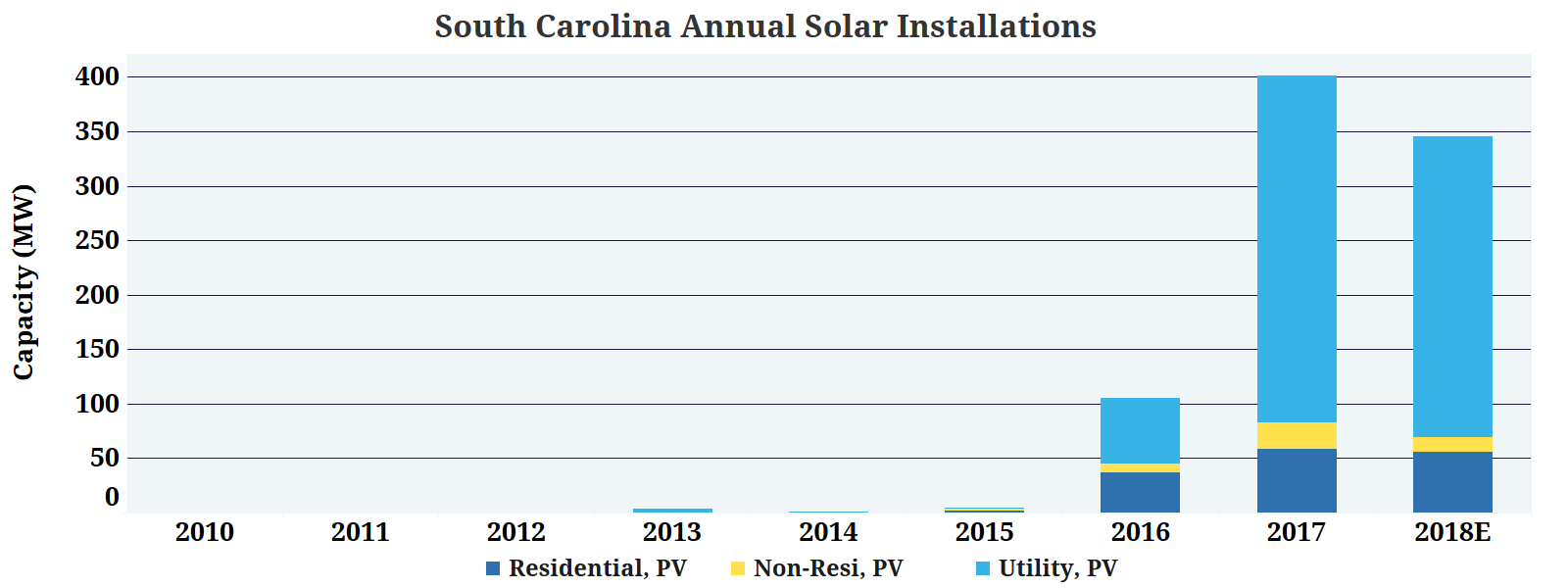As an East Coaster from South Florida, and with brothers and a mother in Georgia, South Carolina, North Carolina, New York, and Connecticut, I travel north and south on I-95 like a professional.
One of the moments on the trip that always make my heart bump is as we head south from North into South Carolina – and we see the palm trees lining the highways. We’ve entered the south, where the sun shines. And where one might think solar power would flourish…yet unlike I-95 traffic, solar has been slow moving.
The South Carolina House has passed H3659 – the Energy Freedom Act by a vote of 110-0, and the bill is now heading to the Senate. Solar proponents note that the net metering caps would be hit in less than a month without a cap extension.
Per a summary by SEIA, the bill offers seven area of benefit to the solar industry:
- Net metering for current customers extended until 6/1/2021, utility lost revenue recovery subsidy regarding net metering ends on same date, and the Public Service Commission (PSC) will make a long term rate determination.
- Large solar will see some pending projects get a 10-year utility contract at PSC approved avoided cost pricing, moving forward a firm avoided cost price will be determined, and interconnection standards – plus enforcement methods – will be designed and implemented.
- A commercial and industrial program will be created, no cost shifting to other customers allowed.
- Neighborhood/Community Solar programs will be created.
- A Customer Bill of Rights will be created that allows customers to have greater control of their electricity.
- Edits to the Integrated Resource Planning process that will require the analysis of multiple alternative futures that also include high levels of renewable and energy efficiency.
- Increased oversight by the PSC during generation procurement.
Last year, a bill to overhaul South Carolina’s solar policies suffered a sudden shift of direction after it was noted that a portion of the bill included a property tax exemption for residential solar power upgrades, and thus it required a 2/3 majority to pass. The vote failed at 61-44, as 82 votes were needed for passage.
One state representative in particular, Peter M. McCoy, Jr. (R-Charleston, below tweet) has been identified by Vote Solar and others as playing a big role in this bill passing. Good work sir.
Proud to work with so many great folks to get solar expansion passed in the SC House by a vote of 110-0. #SCSolar #SCJobs pic.twitter.com/hENiVhHQIi
— Peter M. McCoy, Jr. (@petermccoyforsc) February 21, 2019
Per the Solar Foundation’s National Job Census, the state has just under 3,000 solar jobs. Per SEIA, South Carolina has the 18th-largest installed solar capacity in the nation at 616 megawatts, and in 2017 it was the 8th-largest state market.

This content is protected by copyright and may not be reused. If you want to cooperate with us and would like to reuse some of our content, please contact: editors@pv-magazine.com.








I AM SO GLAD WE ARE FINALLY going Solar Thanks so much.
Thank you so very much.
Finally moving toward lighting for all.
ruling has to be changed for HOA to allow solar panels on homes
These bills really don’t do much for net metering if you have Duke or Dominion (SCE&G) as your provider BECAUSE both house and senate bills still have the 2% of the 5 year average peak demand cap. Anyone trying to apply after that 2% cap has been hit by their utility (already hit by Duke and expected to be hit NOW by Dominion (so much so that they are only even accepting applications for net metering through tomorrow May 3rd).
So the big dogs have still kept their cap for net metering at 2% – I don’t know whether the little utilities have gotten close to the 2% yet or not.
I should say for expanding consumer solar by promoting net metering. IF you already have solar, or can sneak in under the 2% cap with your provider, you can enjoy net metering until May 31, 2029. So 10 years. Not sure if those of us already on solar (whose net metering is slated to expire on Dec. 31, 2025) can extend or not yet. Hope so – every year helps.
If they bump our sell options back to avoided costs for any excess, well, for SCE&G last November, that was 3.25 cents, as opposed to the minimum 11 to 13+ cents we pay to SCE&G/Dominion for our power coming into the house.